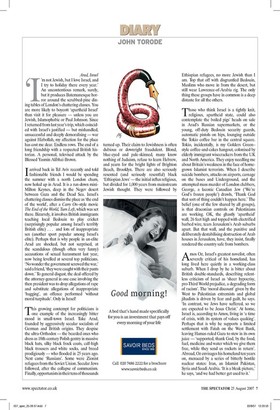Diary
JOHN TORODE Arad, Israel 1 6 'm not Jewish, but I love Israel, and I try to holiday there every year.' An uncontentious remark, surely, but it produces Batemanesque horror around the scrubbed-pine dining tables of London's chattering classes. You are more likely to boycott 'apartheid Israel' than visit it for pleasure — unless you are Jewish, Islamophobic or Paul Johnson. Since I returned from last year's trip, which coincided with Israel's justified — but mishandled, unsuccessful and deeply demoralising — war against Hizbollah, my affection for the place has cost me dear. Endless rows. The end of a long friendship with a respected British historian. A personal, televised attack by the Blessed Yasmin Alibhai-Brown.
T arrived back in Tel Aviv recently and told 1 fashionable friends I would be spending the summer with a north London chum, now holed up in Arad. It is a run-down miniMilton Keynes, deep in the Negev desert between Gaza and the Dead Sea. Israel's chattering classes dismiss the place as 'the end of the world', after a Carry On–style movie The End of the World, Turn Left, which was set there. Bizarrely, it involves British immigrants teaching local Bedouin to play cricket (surprisingly popular among Israel's terribly British elite) . . . and lots of inappropriate sex (another sport popular among Israel's elite). Perhaps that is why people in un-elite Arad are shocked, but not surprised, at the scandalous (though often very funny) accusations of sexual harassment last year, now being levelled at several top politicians. 'No wonder the government screwed the war,' said a friend, 'they were caught with their pants down.' To general disgust, the deal offered by the attorney-general in one case involving the then president was to drop allegations of rape and substitute allegations of inappropriate 'hugging', an offence performed 'without moral turpitude'. Only in Israel!
rr his growing contempt for politicians is one example of the increasingly bitter mood in small-town Israel. Take Arad, founded by aggressively secular socialists of German and British origins. They despise the ultra-Orthodox — the bearded ones who dress as 18th-century Polish gentry in massive black hats, silky black frock coats, calf-high black trousers and white socks, and breed prodigiously — who flooded in 25 years ago. Next came 'Russians'. Some were Zionist refugees from the Soviet Union. Secular Jews followed, after the collapse of communism. Finally, opportunists in their tens of thousands turned up. Their claim to Jewishness is often dubious or downright fraudulent. Blond, blue-eyed and pale-skinned, many know nothing of Judaism, refuse to learn Hebrew, and yearn for the bright lights of Brighton Beach, Brooklyn. There are also seriously resented (and seriously resentful) black 'Ethiopian Jews' — the initial influx religious, but divided for 1,000 years from mainstream Jewish thought. They were followed by Ethiopian refugees, no more Jewish than I am. Top that off with disgruntled Bedouin, Muslims who move in from the desert, but still wear Lawrence-of-Arabia rig. The only thing these groups have in common is a deep distaste for all the others.
Those who think Israel is a tightly knit, religious, apartheid state, could also contemplate the boiled pigs' heads on sale in Arad's Russian supermarkets, or the young, off-duty Bedouin security guards, automatic pistols on hips, lounging outside the Tokio coffee bar in the central square. Tokio, incidentally, is my Golders Green– style coffee-and-cakes hangout, colonised by elderly immigrant wisecrackers from the UK and North America. They enjoy needling me about Britain's weakness in the face of homegrown Islamist terrorists. When I describe suicide bombers, attacks on airports, carnage on the buses and Underground, and the attempted mass murder of London clubbers, George, a laconic Canadian Jew ('We're God's frozen people') drawls, 'Thank God that sort of thing couldn't happen here.' The belief (one of the few shared by all groups), is that draconian controls on Palestinians are working. OK, the ghastly 'apartheid' wall, 26 feet high and topped with electrified barbed wire, tears Jerusalem's Arab suburbs apart. But that wall, and the punitive and deliberately destabilising destruction of Arab houses in Jerusalem, have, they insist, finally rendered the country safe from bombers.
Amos Oz, Israel's greatest novelist, often severely critical of his homeland, has long lived here quietly in a working-class suburb. When I drop by he is bitter about British double-standards, describing relentless criticism of Israel as 'sheer hypocrisy, pro-Third World prejudice, a degrading form of racism'. The 'moral discount' given by the West to Palestinian extremists and global jihadists is driven by fear and guilt, he says. 'In contrast, we Jews have suffered, so we are expected to be Jesus Christ.' At home, Israel is, according to Amos, living in 'a time of crisis, with its system of values quaking'. Perhaps that is why he supports a limited settlement with Fatah on the West Bank, leaving Hamas-ruled Gaza to stew in its own juice — 'supported, thank God, by the food, fuel, medicine and water which we give them free, while they send us rockets in return'. Abroad, Oz envisages his homeland ten years on, menaced by a series of bitterly hostile nuclear states: Iran, an Islamist Pakistan, Syria and Saudi Arabia. 'It is a bleak picture,' he says, 'and we had better get used to it.'









































 Previous page
Previous page